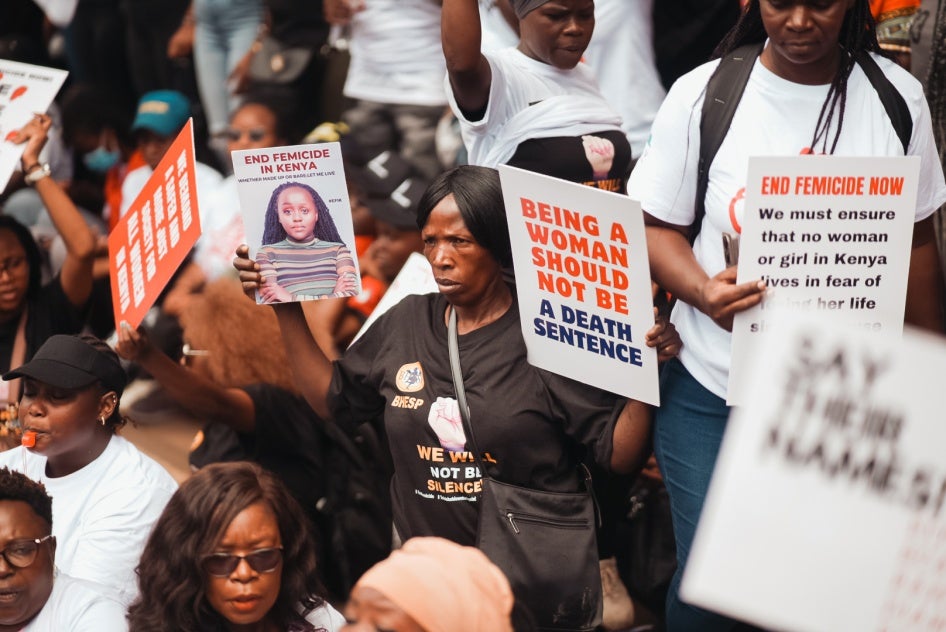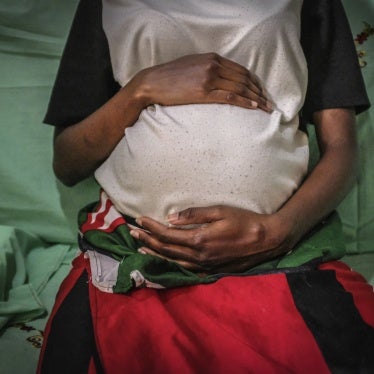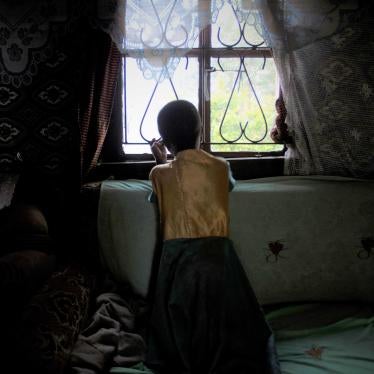The Kenya government needs to listen to its people and take all necessary measures to prevent and address femicide. It is unacceptable that men kill hundreds of women each year because the authorities have allowed patriarchy and gender inequality to go unchecked. Women have just as much of a right to life, dignity, and security of their person as anybody else.
Between January 26 and February 1, thousands of women in Kenya and their allies including friends, families, and civil society took to the streets, in various parts of the country, for the #EndFemicideKE and #TotalShutdownKE marches . Though revolutionary in their turnout and reach, these marches are not the first of their kind. Kenyans also took to the streets in 2019 for the first #TotalShutdownKE march, calling on the government to recognize femicide as a national crisis and providing a detailed memorandum on the urgent measures that the government needed to take to effectively address it. To date, none of the proposed measures have been implemented.
“We are marching for the hundreds of women whose names we know and the thousands whose names we don’t,” said Rachael Mwikali, one of the leaders of the movement that organized the marches. “We are marching because we are tired of living in fear. We are marching because there must be accountability for perpetrators of any form of violence against women and girls and femicide, and there must be justice and access to redress for victims and survivors.”
In early January, a man she knew stabbed Scarlet Wahu to death in an apartment in Nairobi. The exact nature of her relationship with the man is unclear. In April 2023, Ada Ameru was raped, burned with an iron box, then strangled to death in Narok County. The prime suspect in her murder was a man she met at a club the night she disappeared.
In 2020, during a first date, Moses Njoroge pushed Eunice Wakimbi out of a 12th-floor window in Nairobi County. She landed on a balcony on the 9th floor and suffered serious pelvic injuries that required months in hospital. Njoroge was convicted of causing grievous harm and sentenced to five years in prison , a lesser sentence than that required by law. Similarly, in December 2023, Billington Mwathi was convicted of murder for raping, bludgeoning, and stabbing Sheila Lumumba , a non-binary lesbian, to death in 2022. His sentence was also less than that required by law. In 2019, Evelyn Musira was hacked to death with a panga. It is unclear if the main suspect, a male family member, was ever apprehended by police or tried.
These cases illustrate the nature of femicide in Kenya: it is often committed by men who are known to the victims, including current and former husbands and intimate partners, first dates, and everything in between. It is brutal and gruesome. Access to justice for survivors and victims’ families is inadequate in the best of cases and non-existent in most other instances.
These are not isolated incidents of femicide but rather a drop in the bucket. The exact statistics for femicide are not known because the government does not collect data on it. However, in 2023 alone, a local civil society organization monitoring news on femicide in the country, recorded 152 cases. The actual number of cases of femicide is much higher as many cases are not reported particularly when the woman is part of a marginalized group, for instance, sex workers, or when the man is influential, wealthy, or a government official.
“Our constitution recognizes every person’s rights to life, dignity and security of the person,” Mwikali said. “It recognizes that women in the country are often marginalized because of their gender and, because of this, specifically requires that the government address discrimination against women in all their diversities including violence meted out against us because of our gender. We are not seeing this happening! So we shall advocate, we shall march, we shall scream and we shall shout until duty bearers hear us when we say, ‘We are not safe! Stop killing us!”
The women of Kenya are justifiably exhausted by the constant threat to their lives and the lack of justice and support when violence is meted out against them. The government needs to act. It should recognize the gravity of the situation and declare femicide a national crisis. It should also, with immediate effect, begin to take measures to address the situation.
It should develop and fund data collection and management systems to monitor femicide. It should enforce the two-thirds gender rule required by the Constitution to end the male supermajority that exists in most government institutions and bodies and allow femicide and violence against women to thrive.
The government should also develop and put in place country-wide education programs that address and debunk negative gender stereotypes and patriarchal norms. It should enact laws and policies that prohibit femicide and ensure prompt access to justice, redress, and support for victims and their families.









